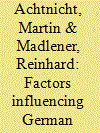| Srl | Item |
| 1 |
ID:
109340


|
|
|
|
|
| Publication |
2011.
|
| Summary/Abstract |
This article employed a standard LCC to conduct economic analysis of upgrading the aging residential buildings in China. According to the current situation, an interest rate of 6%, an inflation rate of 3%, an increase rate of annual energy savings of 2% and an increase rate of electricity price of 2% were assumed in the method. The results indicated that only relying on gradually increasing electricity price and governments' subsidies was not enough. After detailed analysis of the energy saving measures and the distribution of all benefits from building energy retrofit, it was found that actually only 1/3 of original cost was spent only for energy savings, the second 1/3 for both energy savings and good façade appearance and occupants should share the last 1/3 because even if without energy retrofit, they would have to pay the part too. The corresponding results proved that the first 1/3 of investment cost could be drawn back within the residue life cycle, and so the investment could be accepted in a sheer market economy. In the end, a model about distribution of investment cost of and benefits was proposed to adapt the market economy to overcome the financial problems in China.
|
|
|
|
|
|
|
|
|
|
|
|
|
|
|
|
| 2 |
ID:
133142


|
|
|
|
|
| Publication |
2014.
|
| Summary/Abstract |
In this paper, we identify key drivers and barriers for the adoption of building energy retrofits in Germany, which is promoted by public policy as an important measure to address the future challenges of climate change and energy security. We analyze data from a 2009 survey of more than 400 owner-occupiers of single-family detached, semidetached, and row houses in Germany, that was conducted as a computer-assisted personal interview (CAPI). In the survey, respondents were asked directly for reasons for and against retrofitting their homes, but also faced a choice experiment involving different energy retrofit measures. Overall, we find that house owners who are able to afford it financially, for whom it is profitable, and for whom there is a favorable opportunity are more likely to undertake energy retrofit activities. The latter point seems to be of particular importance in explaining the persistent low retrofit rate in Germany. Our results suggest that professional energy advice could stimulate the demand for building energy retrofits.
|
|
|
|
|
|
|
|
|
|
|
|
|
|
|
|